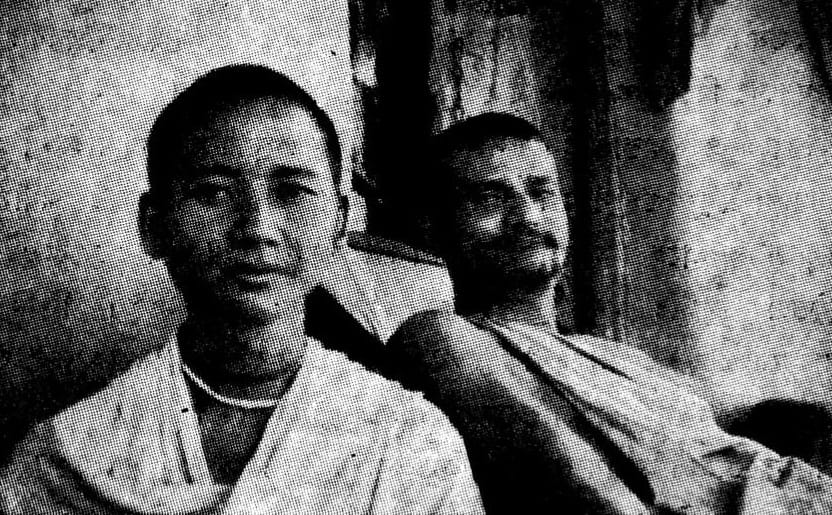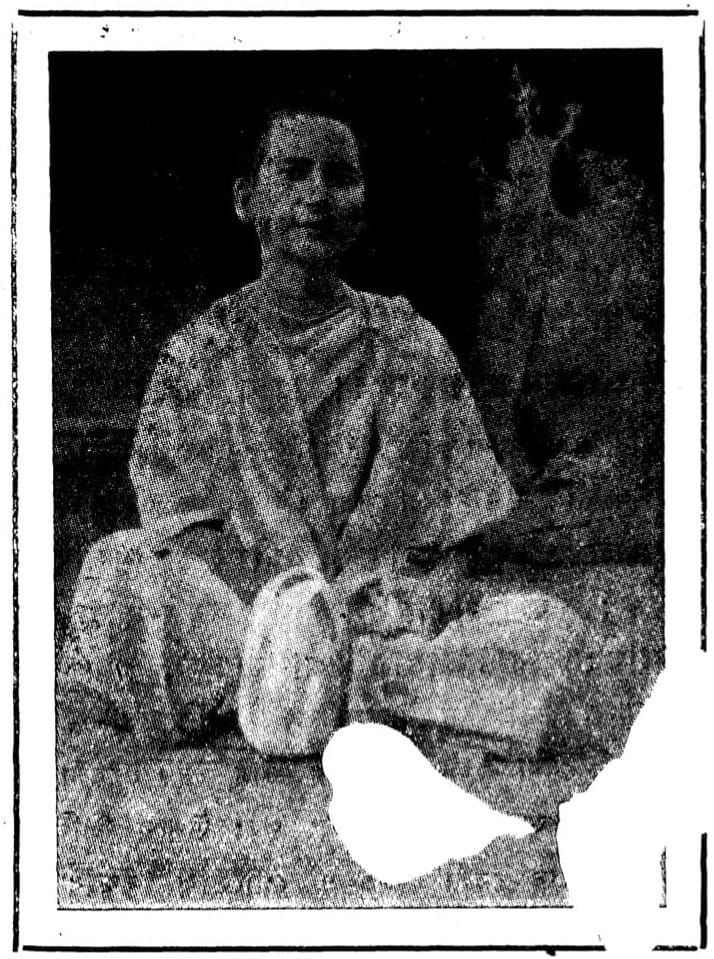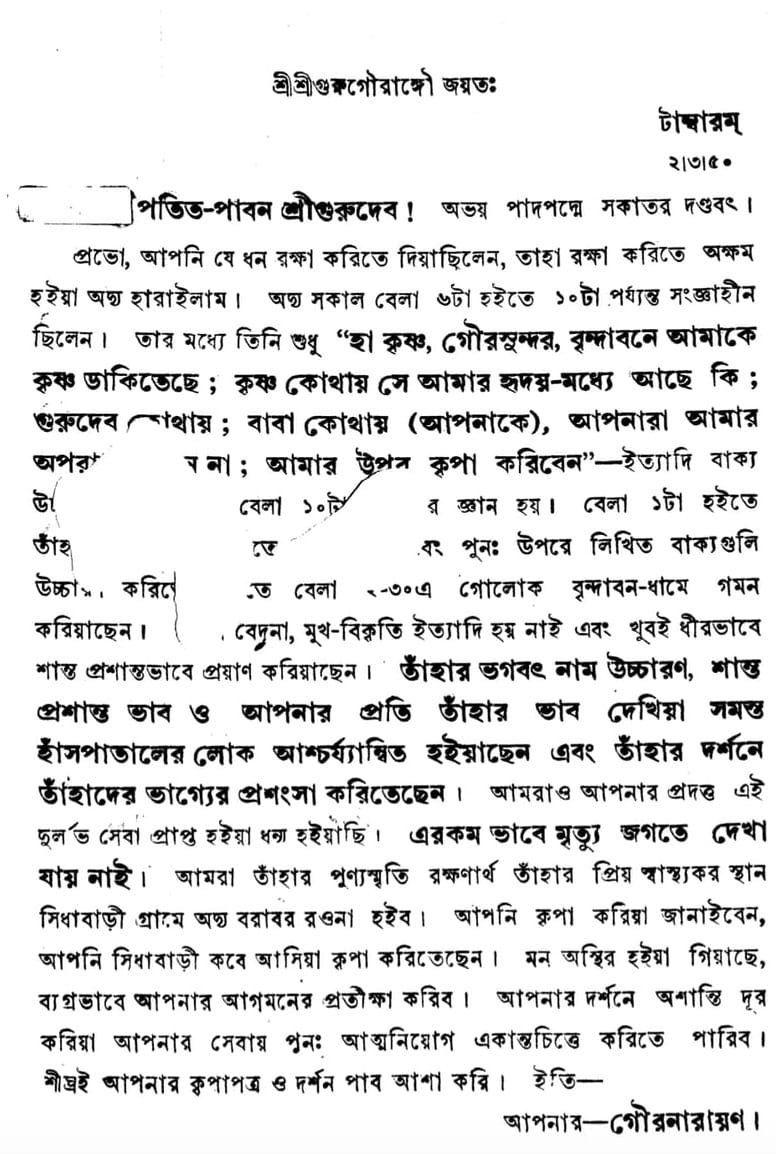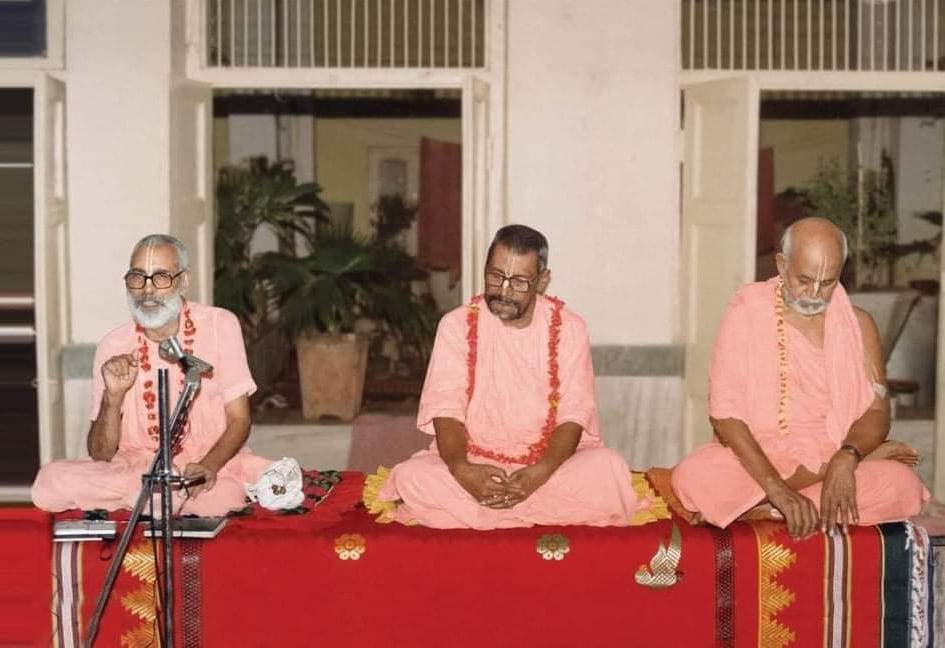Śrīla Gurudeva's Prabandhāvalī Series: (1) Śrī Anaṅga-mohana Prabhu's Passing

Our worshipful Paramagurudeva, Nitya-līlā-praviṣṭa Oṁ Viṣṇupāda Śrī Śrīmad Bhakti Prajñāna Keśava Gosvāmī Mahārāja, launched Śrī Gauḍīya Patrikā in March of 1949, reviving Śrīla Bhaktisiddhānta Sarasvatī Ṭhākura Prabhupāda's Gauḍīya magazine. From the very beginning, listed as "associate editors" were Paramagurudeva's beloved trio of disciples: Paṇḍita Śrī Sajjana-sevaka Brahmacārī (also the publisher), Paṇḍita Śrīyuta Rādhānātha Dāsādhikārī, and Paṇḍita Śrīyuta Gaura-nārāyaṇa Dāsādhikārī. While Śrīla Gurudeva may have written some preaching reports published in the first year of Śrī Gauḍīya Patrikā, his name does not appear till the second year, at the end of a letter written to Paramagurudeva regarding the passing of Śrī Anaṅga-mohana Prabhu. I suspect that the introductory and concluding material surrounding Śrīla Gurudeva's letter was written by Śrī Sajjana-sevaka Brahmācārī Prabhu (Śrīla Bhaktivedānta Vāmana Gosvāmī Mahārāja), and Gurudeva's letter is followed up by a poem written by Śrī Rādhānātha Dāsādhikārī (Śrīla Bhaktivedānta Trivikrama Gosvāmī Mahārāja) that praises both Śrī Anaṅga-mohana Prabhu and, discreetly, Śrīla Gurudeva. Always inseparable these three, in service for all time, as Śrīla Trivikrama Mahārāja's poem alludes to (see verse 7).
This is the first of over fifty instalments of the "Prabandhāvalī Series" of Śrīla Gurudeva's writings as they appeared chronologically from 1950 onwards in both Śrī Gauḍīya Patrikā and Śrī Bhāgavata Patrikā. I would like to extend special gratitude to Śrīmān Sundara-gopāla Prabhu (Fiji) for doing the initial painstaking research, involving numerous devotees in translating these articles, and tirelessly encouraging me in serving Śrīla Gurudeva for many years. I also owe special thanks to the Rays of the Harmonist team for their unflagging encouragement, advice, and support. And the first part of the following instalment is borrowed from the Rays of the Harmonist with a few editorial adjustments.
—Śrīvāsa dāsa

(1) The Departure of Śrīpāda Anaṅga-mohana Brahmacārī
Śrī Gauḍīya-patrikā, Year–2 (1950–1951), Issue–2, page 76:
It is with particular sadness that we inform [the readers] that on this past 2nd of March 1950, 18th of Phālguna 1365 [Bengali year], the trayodaśī-tithi of the month of Phālguna, a Thursday, at 2.30 p.m., Śrīpāda Anaṅga-mohana Brahmacārī departed to his own abode, leaving us all forever. He spent the last six months of his life in Tāmbaram, a very healing locale in the mountains, situated ten miles south of Madras. Two mahodayas (sirs), the revered Śrīpāda Triguṇātīta Brahmacārī (Śrī Triguṇanātha Mukhopādhyāya), the best of the bhaktas, who was extremely affectionate toward Anaṅga-mohana Brahmacārī, and his (Anaṅga-mohana Brahmacārī’s) devout sevaka, Bihar resident Śrīyuta Gaura-Nārāyaṇa dāsa Adhikārī, have put even their lives at risk as they accepted responsibility for his treatment and availed themselves of the opportunity to serve his every need during his last days. We are publishing here the letter they sent informing us about the grievous news of Śrīpāda Anaṅga-mohana Brahmacārī’s entering aprakaṭa-līlā.

śrī śrī guru-gaurāṅgau jayataḥ
Tāmbāram
2 March 1950
Patita-pāvana Śrīla Gurudeva! It is with great anguish that I offer my daṇḍavat-praṇāma at your lotus feet, which grant fearlessness.
O Prabhu! That most precious treasure you entrusted to me to protect, I was incapable of protecting, for today I have lost him. This morning, from 6 till 10 o’clock, he was without outer awareness. In that condition, he was saying, “Hā Kṛṣṇa, hā Gaurasundara! Kṛṣṇa is calling me to Vṛndāvana! Where is Kṛṣṇa!? Is He in my heart? Where is Gurudeva, where is Bābā (father)? Please disregard any of my offences to you! Please bestow your mercy upon me!” At 10 o’clock he came back into external consciousness, but from 1:00 p.m. onward, his pulse again started to drop, and again he started calling out the same words mentioned above. Then, at 2:30 p.m., he departed for Goloka Vṛndāvana Dhāma. He did not experience any pain, his face did not distort in the slightest or anything like that, and he departed in a completely peaceful, serene manner. The hospital staff were wonderstruck to see his chanting of Bhagavān’s holy names, his peaceful state of mind and his feelings for you, and they praised their own fortune for having had the darśana of such a personality. We too are blessed to have received this rare service from you. Deaths like this are simply not seen in this world. To honor his auspicious memory, we will at once depart for Siddhābāḍī-grāma, his favourite health resort. Kindly inform us when you will mercifully come to Siddhābāḍī. Our minds are now restless, and we anxiously await your arrival. Upon receiving your darśana, we will be able to do away with our unease and be able to resume our one-pointed, dedicated service to you. We hope to quickly receive your merciful reply and your darśana. Thus—
Yours—Gaura-Nārāyaṇa
Śrīpāda Anaṅga-mohana Brahmacārī was an ideal guru-sevaka. He is an eternal companion of Śrī Gurupāda-padma, and as his right arm, he continuously remained with him like a shadow, always absorbed in pleasing him and rendering viśrambha-sevā (intimate service) to him. By his simple, guileless behavior and sincere service, he became the special recipient of adoration and affection from the Vaiṣṇavas.
When he was engaged in service and the rest of the time as well, he was always seen to be happy and delighted at heart. His beautiful face, adorned with laughter and smiles, captivated everyone’s heart. His boundless tolerance for suffering set an ideal for all. Even in the midst of extreme sorrow and torment, no change was ever observed in his beautiful smiling face.
He was very expert in a great variety of services. His greatest expertise revealed itself in the cooking and various related tasks he performed for the service of Śrī Hari, guru, and Vaiṣṇavas. His skill at playing mṛdaṅga and, above all, his kīrtana, which he sang in his naturally charming and exceedingly sweet voice, was like a delicious tonic to the hearts and ears of all and therefore drew much love and attention from everyone.
Such an illuminating example of an ideal guru-sevaka is extremely rare. In separation from him, all in Śrī Gauḍīya Vedānta Samiti, especially us, his insignificant god-brothers who were charmed by his qualities, are disheartened by his absence. Thinking about his untimely departure at age twenty-one, all are bewildered. May his illuminating ideal of service to śrī guru and the Vaiṣṇavas guide us on the path of bhakti and always inspire us to serve. This is our sole prayer.
kṛpā kari’ kṛṣṇa more diyāchilā saṅga
svatantra kṛṣṇera icchā,—kailā saṅga-bhaṅga
Śrī Caitanya-caritāmṛta (Antya-līlā 11.94)
[Mahāprabhu said: “Śrī Kṛṣṇa mercifully bestowed upon Me the association of Śrī Haridāsa Ṭhākura, but today, by the desire of Kṛṣṇa, who is the all-independent Lord, that association has been taken away.”]
—janaika hatabhāgā (“one unfortunate person”)
Śrīla Trivikrama Mahārāja's Poem:
“Mad Bhakta-Pūjābhyadhikā"
"The worship of my devotee is greater [than My own].”
—Śrīmad Bhāgavatam (11.19.21)
śunechinu śāstrete ei mahā-vāṇī
dekhi nāi kabhu tāra nitya chabi-khāni (1)
I have heard this grand statement in scripture
But never have I seen its eternal depiction
nayana bhariyā bhāi dekhinu e’bāra
prabhu-bhṛtya dāsa-dāsya adbhuta vyāpāra (2)
Now I have seen it, brother, to my eyes’ fill
Master and servant, and service to the servant are wondrous affairs
sevakera sevya-sevā nahe camatkāra
atīva madhura āhā sevaka-sevāra (3)
The servant serving one who is to be served is not astonishing
But how exceedingly sweet is service to the servant
bāhya cakṣe māyā-maya kintu māyā-pāra
viśuddha bhūmikā-bhāti viśuddha vistāra (4)
Externally, to the eyes, illusory, but actually beyond illusion
Radiance of the immaculate plane, immaculately expanding
he prabho, anaṅga-mohana, sārthaka tava nāma
vajrād-api-kaṭhora-jayī sārthaka tava kāma (5)
O master, Anaṅga-mohana, worthy is your name
Conqueror of one who is harsher than a thunderbolt, worthy is your desire
sucandra-vadane hā̃si sevāra ānande bhāsi
haraṇa karecho sevya-mana
kīrtane madhura kaṇṭha avatāri’ śrī vaikuṇṭha
tuṣileka hṛdayera dhana (6)
With a beautiful moon-like face, carried away in the bliss of service,
You have stolen the mind of the object of your service.
In kīrtana, with your sweet voice, you caused Śrī Vaikuṇṭha to incarnate.
You pleased the treasure of [our] hearts.
prabhura śrī aṅga-sevā “anaṅga” jāniyā ĵebā
nitya-kāla karile sādhana
ādarśa haiyā rabe āmā sabā hṛdi-mājhe
śikhāite śrī-guru-sevana (7)
Whoever knows the service of the master’s aṅga (limbs, disciples) to be anaṅga (incorporeal)
And strives eternally thus
Will become exemplary, remaining in all our hearts
To teach service to śrī guru
gurudeva-manobhīṣṭa sādhite parama-iṣṭa
barile beyādhi bhayaṅkara
śikhā’le śaraṇāgati ṣaḍ-aṅga paramā satī
bhakatera nitya sahacara (8)
To fulfill gurudeva’s innermost desire was his ultimate ambition
Bore a fearsome illness, he did
Teaching surrender, six-fold, the supreme chastity
The eternal companion of the devotee
tomāra sad-guṇa ĵata āmi vā balibo koto
ihā mātra kori nivedana—
ĵe-guṇe haiyā vaśa prabhu gāya bhṛtya-ĵaśa
kaṇā tāra kari ākiñcana (9)
How many of your virtues can I articulate?
All I request is this—
The qualities which compel the master to sing the servant’s fame
I long for just a particle of that.
—Śrī Rādhānātha Dāsādhikārī
[Śrīmad Bhaktivedānta Trivikrama Mahārāja]


